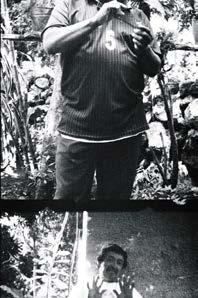
3 minute read
Louise Stern
Louise Stern
Writer and artist
Advertisement
For those who may not know you or be familiar with your work, in your own words how would you describe yourself?
I am a writer and artist; my work looks at communication and language, often filtered through my deafness and my native sign language.
You once mentioned that language is what makes us human, would you be able to elaborate for us?
All living creatures communicate, but the extent to which we depend on formal language distinguishes us from other animals. Why is instinct not enough for us? Why are we so driven to try defining ourselves and our experience of the world through language? I believe that these things are at the heart of the mysterious, joyful, and sad human condition.
Sad human condition, that’s an interesting perspective. Why do you think it’s sad if that’s also what distinguishes us?
I do think that the human condition has a considerable element of sadness - while it also has much else. Looking in the newspaper daily is sad…. while there are of course great beauties and kindnesses all around me on the street daily, our need to delineate and distinguish doesn’t lend itself to a joyful created reality in my eyes - certainly not what we have the potential for. Our need for formal language is a large part of that.
How do you/others challenge the boundaries of language?

In Style and Number 5 - from a separate photo series taken in Chican, the deaf village, that I’m working on bringing movement to in a new art project
Questioning not just what we say, but how we say it may never have been more essential. In this day and age, when words surround us but may not transmit much of substance, we should ask what relationship words have to concrete reality. What is true? When we remove the screen of language, are we able to see more clearly or see different things? These are pressing concerns. Anyone who pushes us to see new things is challenging the boundaries of language; I am interested in addressing them explicitly in my work.
Apart from yourself, Is there anyone in particular that comes to mind when you think about those who push us to see new things and challenging the boundaries of language? Who inspires you to push the boundaries of language?
So many! Juan Rulfo, Paul Celan, Tessa Farmer, Saskia de Brauw, Alberto Giacometti, Jean Rhys, Omar Salamanca Lopez, Francis Bacon to name a few. Not that I place myself in their category at all, but that is who inspires me, along with the deaf community.

Terry and Sofia - from a photo series focusing on physicality
How are you trying to challenge the normalities of the use of certain words?
In my work, I try to find tangible expression in language. Instead of saying ‘bad’ or ‘ good’ in a piece of writing, I want to use words that show how something that I want to put across as bad or as good smells, feels, looks. By doing this, I hope I am asking myself and the reader what it is that perception is based on. In the short film I just wrote and directed for Film 4, handwritten notes are shown on screen as one way of showing dialogue. Banal words look strange; throwaway phrases acquire resonance, especially when presented alongside the heightened physical expression that also features in the film. Via these creative strategies and others, I want to investigate the true meaning of words and how we see them. Why do we make the judgments that we do in everyday life?
Sounds very interesting? Are you allowed to tell us abit more about it and when it will be airing?
It’s called “Boat” - it’s a 20-minute short based on a story from my first book, expanded with elements from visual work. It has some beautiful actors and dancers, and was shot on 16mm film by Patrick Mellor. We’re in post production now and then it will go out to film festivals - other venues for its release will depend on Film 4 and how good it is!

Terry and Sofia - from a photo series focusing on physicality
Are you involved in any spaces that reimagine different ways of using language?
My work is this space; other creative works that awaken me are this space.
How does an individual’s actions play in enforcing the biases of language?
Every time we use words reflexively, we are enforcing the bias of language.

A page from A Strange Story - a book of short stories made up solely of handwritten conversations and shown as an artwork.









